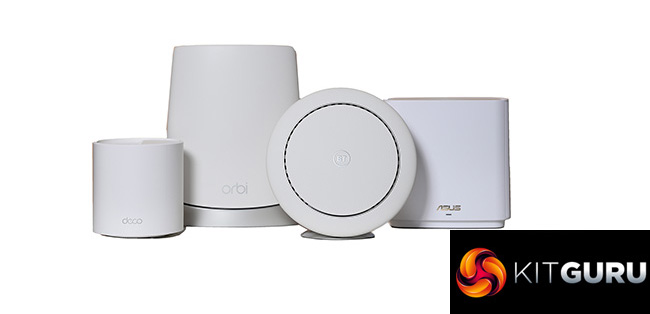As we have learnt over the last few years of testing mesh WiFi, there isn't always an absolute winner. None of the five systems on test here are terrible. They all have their strengths. But there are nuances of excellence. It is a shame we only had two ASUS ZenWiFi AX units, because it would have been good to see what ASUS could achieve with three.
Here are our final words on each of the products on test.

NETGEAR Orbi AX6000
The NETGEAR Orbi AX6000 with three units is clearly the king of WiFi 6 mesh. With a WiFi 6 client, it can deliver huge speeds and range. It can also supply legacy WiFi 5 and 802.11n clients with very usable bandwidth and range. It's not so clearly a winner with two units. The speed is there at close range, particularly with WiFi 6 and 5 clients, but the two-unit setup drops off much more rapidly with range.
It also has leading hardware features such as four Gigabit Ethernet client ports per device, and 2.5Gbit WAN connectivity on the router. The management options are reasonably comprehensive, too.
However, this is a very expensive option. If you want the ultimate WiFi speed and coverage, with over £900 to spend, the three-unit NETGEAR Orbi AX6000 is absolutely unbeatable. But if your budget is more in the £600 area, the AX4200 three-unit setup isn't as fast but will deliver better range than two AX6000 units.
NETGEAR Orbi AX4200
We usually expect NETGEAR Orbi kit to deliver the best performance. While the AX6000 version remains the king of WiFi 6 mesh, the AX4200 delivers great range with an 802.11ax client all the way out to our gruelling 32m “behind the shed” test. It's not the fastest at every distance, but is superb up to 15m and keeps going very usably all the way through.
On the other hand, while it does provide the longest range with 802.11ac, and the fastest performance at 10m and 15m, the AX4200 is merely good at other distances. It isn't the fastest with 802.11n, either, but does maintain usable speed out to 30m. Throw in the solid management and configuration options, and NETGEAR has delivered a solid mesh package.
You should definitely buy the three-unit version, though. This provides a good balance of performance and price, although for all-out speed pay the extra £300 for the AX6000 three-unit setup.
BT Premium Whole Home Wi-Fi
The BT Premium Whole Home Wi-Fi leads us to similar conclusions to the original Whole Home Wi-Fi. It's not the fastest, but with three units the coverage is surprisingly good. This system only uses WiFi 6 for the backhaul, but it still delivers decent performance with an 802.11ax client up to 25m. Strangely, although three units are generally faster than two, the latter kept its range to 30m.
With an 802.11ac client, the BT kit delivers solid performance out to 30m using three units, but two units only get to 20m. That said, although two BT units deliver better 802.11n performance up to 15m, three units can deliver a signal all the way up to 32m.
Overall, when you consider the sub-£300 price, the BT Premium Whole Home Wi-Fi is a great value way to spread decently quick WiFi around a large house. However, its configuration options are very limited if you want to take greater control over your network.
ASUS ZenWiFi AX
The ASUS ZenWiFi AX is let down by only having two units, although its specification is theoretically closer to the NETGEAR Orbi AX6000. It was the fastest with a WiFi 6 client up close, but drops off from 15m onwards, losing signal entirely at 25m. It does get out that far with an 802.11ac client, but isn't particularly quick at any range. The story is the same with 802.11n.
However, ASUS rules when it comes to management, with the most comprehensive range of options, and we would take it over the two-unit bundle of NETGEAR's Orbi AX4200, which is a little more expensive.
tp-link Deco AX3000
Finally, the tp-link Deco AX3000 is cheaper than NETGEAR's three-unit setup but more expensive than BT's. While it does deliver WiFi 6 to clients, unlike BT, it only has two radios, which clearly limits its abilities. Some of the results are rather odd, with decent WiFi 6 performanc up close that drops off from 15m onwards.
Strangely, two-unit performance is better at 20m and 25m than three-unit performance, and two units reach 32m where three don't. However, while 802.11ac performance is commendable out to 30m with three units, it's behind the cheaper BT kit.
Similarly, 802.11n performance is great out to 30m, but BT has the edge and costs less. The tp-link management interface, while offering some good features via smartphone, is very limited via the Web.
Kitguru Says: The three-unit NETGEAR Orbi AX6000 gets our top all-round accolade, but the BT Premium Whole Home Wi-Fi delivers excellent value.
 KitGuru KitGuru.net – Tech News | Hardware News | Hardware Reviews | IOS | Mobile | Gaming | Graphics Cards
KitGuru KitGuru.net – Tech News | Hardware News | Hardware Reviews | IOS | Mobile | Gaming | Graphics Cards




